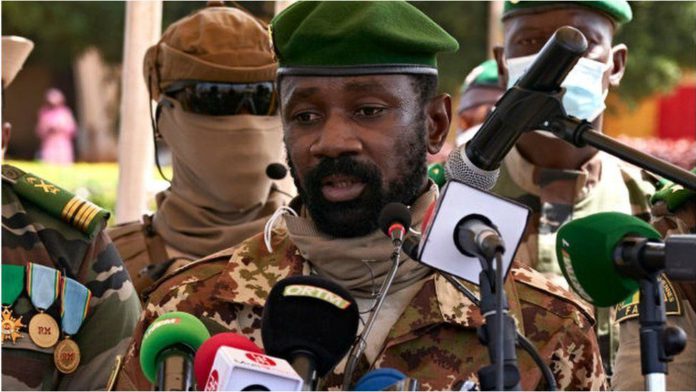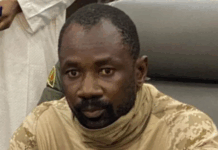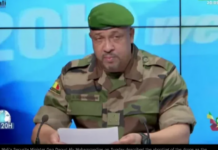
Mali’s interim President Assimi Goita has been targeted in an attempted stabbing attack after Eid al-Adha prayers at the Grand Mosque in the capital, Bamako, his office said.
“The attacker was immediately overpowered by security. Investigations are ongoing,” the presidency said in a Twitter post on Tuesday.
The interim leader was whisked away, according to an AFP news agency journalist, who also said he saw blood at the scene, though it was not clear who had been wounded.
Later on Tuesday, Goita announced that he was doing “very well” following the attack.
“That’s part of being a leader, there are always malcontents,” he said in a statement broadcast on state television channel ORTM.
“There are people who at any time may want to try things to cause instability.”
The attack happened as an imam was directing worshippers outside the mosque for a ritual animal sacrifice.
Religious Affairs Minister Mamadou Kone told AFP that a man had “tried to kill the president with a knife” but was apprehended.
Al Jazeera’s Ahmed Idris reporting from Abuja, Nigeria, said on the ground reports suggested the attacker “posed as an usher” for the mosque.
“When Goita was passing by, he [the attacker] lunged at him. Another report said he was stabbed in the arm, but these are not confirmed yet,” Idris said.
“Right now we’re not clear whether the attacker is a member of the armed groups that have been operating in Mali and across the border in Burkina Faso and Niger. Or a military officer or even a civilian who is not happy with the government.”
Goita, 38, was sworn into office last month despite facing a diplomatic backlash over his second power grab in nine months.
In August 2020, Colonel Goita had led a military coup that removed embattled President Ibrahim Boubacar Keita after months of anti-government protests over perceived corruption and the failure to tackle a deteriorating security crisis that first emerged in 2012.
In late May, Goita, who was serving as Mali’s vice president in a transitional government tasked with leading the country back to civilian rule in February 2022, seized power again after accusing interim President Bah Ndaw and Prime Minister Moctar Ouane of failing to consult him about a cabinet reshuffle.
Political instability
Mali has been unsettled since 2012 when mutinous soldiers overthrew the president of a decade.
The power vacuum led to an Islamic uprising that took control of the country’s northern cities, including Timbuktu and Gao. A French-led campaign removed the fighters from the northern cities in 2013.
A peace agreement was signed in 2015 by three parties – the government, a coalition of groups that seek autonomy in northern Mali and a pro-government militia.
However, the fighters quickly regrouped in the desert areas and began launching frequent attacks on the Malian army and its allies. The extremists, affiliated with al-Qaeda and ISIL (ISIS), have moved from the arid north to more populous central Mali since 2015 where their presence has stoked animosity and violence between ethnic groups.





